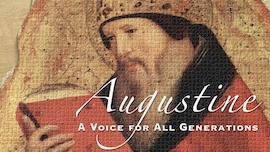Riot in Milan Quelled When Ambrose Agreed to Become Bishop
BISHOP AUXENTIUS of Milan had just died. As a proponent of the Arian heresy, he denied the eternal divinity of Christ. Now crowds surged into the streets, some shouting they wanted an Arian bishop, others demanding an orthodox Trinitarian replacement. If something was not done, there would be a riot. As regional governor, it was Ambrose’s responsibility to oversee the election. A popular nobleman, he pleaded with the crowd to keep the peace.
A child shouted, “Ambrose for bishop!” Others picked up the cry: “Ambrose for bishop! Ambrose for bishop!” In vain he tried to brush off the suggestion. The cry grew more insistent. “Ambrose for bishop!”
“But I haven’t even been baptized!” he argued. It was no use. Emperor Valentinian approved his election. On this day, 7 December 374, Ambrose accepted consecration as bishop of Milan. He had not sought the job, but once it fell upon him, he set his mind to it. One of his first acts was to distribute his possessions to the poor. Soon he undertook an intensive study of theology and embraced the orthodox Trinitarian faith. “To call Christ a Creature savors of a contemptuous cavil, not of a reverent confession,” he said.
His oratorical skills made him a great speaker, whom even the great Augustine of Hippo heard with pleasure. His keen mind led later generations to name him one of the four Latin doctors of the church. He was innovative, too, introducing antiphonal singing into the church.
Ambrose was a gentle man. When Christians relapsed under torture, he counseled that they should be restored, reminding his listeners that “the Lord Jesus had compassion upon us in order to call us to Himself, not frighten us away.” He ransomed captives, even melting the church’s golden utensils to purchase their freedom. However, when right and wrong were at stake, Ambrose was inflexible. Under imperial pressure to give up one of the city’s churches to the Arians, he refused to budge. When Emperor Theodosius had thousands massacred at Thessalonica, Ambrose barred him from church until he publicly repented.
Ambrose died at Easter 397. It took five bishops to handle the baptisms of all the people he had been catechizing. Milan retained the traditions of Ambrose independently of Rome for centuries after his death.
—Dan Graves
-----------
For another take on Ambrose, read "A Gallery of Augustine’s Influences" in Christian History #15, St Augustine
Augustine was the most famous and influential of Ambrose's converts. Watch his story in Augustine: A Voice for All Generations at RedeemTV
Augustine: A Voice for All Generations can be purchased at Vision Video.







